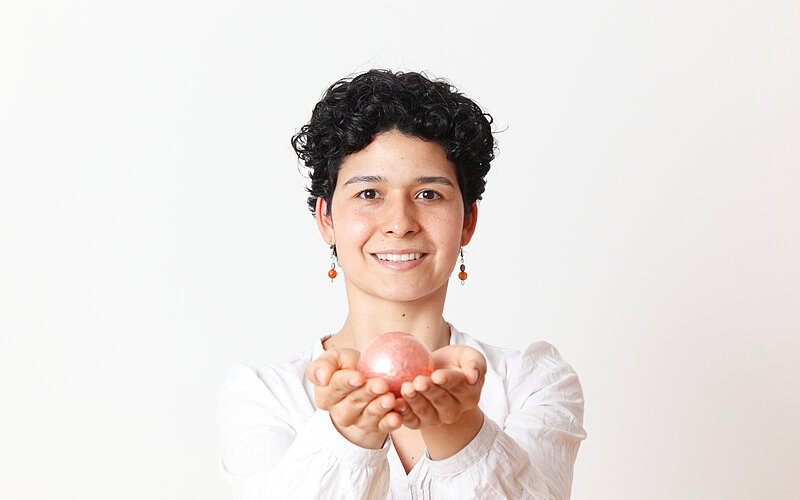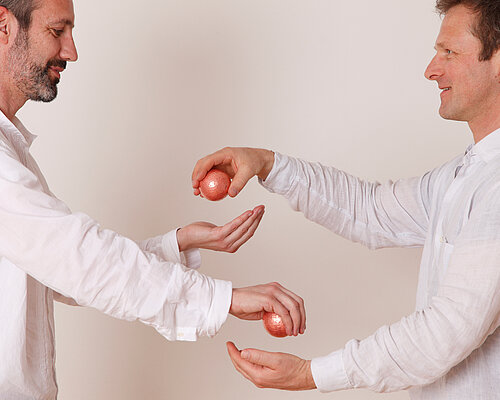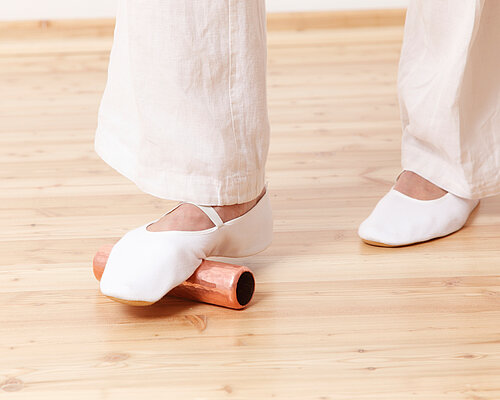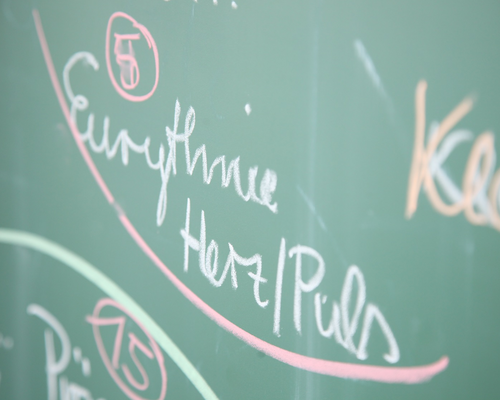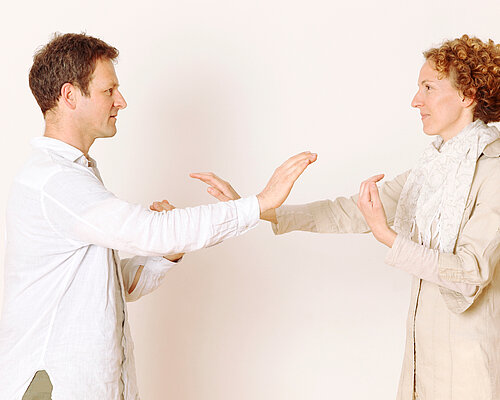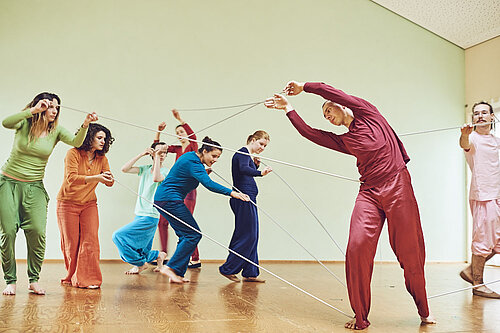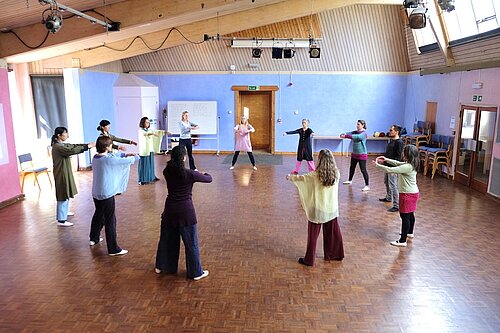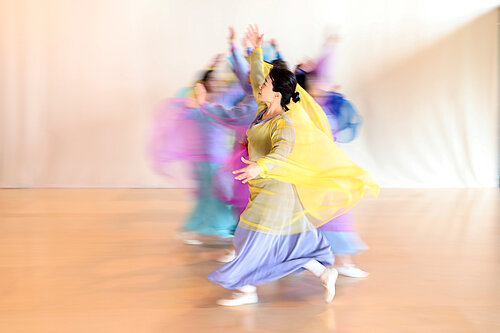
Eurythmy Therapy
Master of Arts
Eurythmy therapy is a movement therapy developed by Dr Rudolf Steiner at the beginning of the 20th century. In eurythmy therapy, the speech sounds of eurythmy are modified and used in a differentiated way for healing purposes in order to stimulate the self-healing powers of the human being. Eurythmy therapy thus has a targeted effect like a medicine - right down to the function of individual organs and organ systems.
In the Master's degree programme with a specialisation in eurythmy therapy, students learn eurythmy therapy skills that are used with different age groups, clinical pictures and in the various fields of practice. They acquire medical basics in order to adequately adapt eurythmy therapy in practice to the respective clinical picture. The basics of scientific work are taught in order to develop the ability to reflect and to be able to communicate the method of eurythmy therapy in an understandable way.
Intensive practical phases accompany the study programme so that the students can develop a therapeutic attitude and accompany the patients in a mindful and supportive way when instructing the eurythmy therapy exercises.
Alanus University offers various options for studying eurythmy therapy depending on the requirements you bring with you. We will be happy to advise you individually on your study options. Please make an appointment with us via e-mail or contact form. We look forward to meeting you!
Target group, duration of studies, admission requirements
COURSE OF STUDY AND ADMISSION REQUIREMENTS
Alanus University offers various options for studying eurythmy therapy, depending on the prerequisites you bring with you. The seminars are designed in such a way that classes can be held together for all students in one year.
Master's programme in eurythmy therapy
The basic requirements for admission to the course are a completed eurythmy degree from a recognised training institution (eurythmy diploma from the Section for the Performing Arts/Goetheanum), a Bachelor of Arts academic degree and a successful entrance interview.
After successful completion, graduates receive a Master's certificate from Alanus University and a certificate from the Medical Section at the Goetheanum/Dornach.
University Certificate Eurythmy Therapy
For those interested who do not wish to obtain an academic degree, it is possible to obtain the university certificate in eurythmy therapy. The basic requirement for admission to the course is a completed eurythmy degree from a recognised training institution (eurythmy diploma from the Section for the Arts of Speech and Music/Goetheanum) and a successful entrance interview.
After successful completion, graduates receive a university certificate in eurythmy therapy from the Alanus Hochschule and a diploma from the Medical Section at the Goetheanum/Dornach.
The course lasts at least 4 semesters and begins annually in the autumn semester in September.
Course Contents and Structure
The contents of the Master's programme are divided into 9 thematic blocks (modules).
MA 1 Fundamentals of Eurythmy Therapy
Students acquire skills in understanding and instrumentally transforming the eurythmy movements into the eurythmy therapy movements. They are enabled to experience the basic eurythmy-therapeutic exercises in their effect in order to arrive at an independent elaboration and performance of these exercises. In addition, students acquire social skills relevant to their profession.
MA 2 Applied Eurythmy Therapy I
The students are specifically prepared for everyday professional life, the topics of therapy goal, treatment plan and treatment processes are developed and adequate documentation and self-critical evaluation are practised. An introduction to general and special pathology from the perspective of eurythmy therapy, indications and contraindications are discussed.
MA 3 Applied Eurythmy Therapy II
Eurythmy therapy is deepened on the basis of special clinical pictures. The students are able to grasp therapeutic exercise sequences for special disease indications and to create a therapy goal, treatment plan and implementation (duration, intensity, etc.) appropriate for the patient. The independent extension and modulation of usual indications to special exercises is learned. The students can place eurythmy therapy in the context of other artistic therapies and critically reflect on the specific possibilities and limitations of eurythmy therapy.
MA 4 Medicine I
The students acquire a basic knowledge of the general and specific theory of illnesses of physical and mental illnesses. This can include both conventional and anthroposophically extended medicine. From knowledge of the manifestations of the various specific diseases, they arrive at a picture of the sick person, for whom general points of view on therapy are then worked out and anthroposophical therapeutic approaches are presented. The students are put in a position to independently acquire in-depth knowledge of selected clinical pictures.
MA 5 Medicine II
Students acquire a basic knowledge of special disease theory from the fields of orthopaedics and neurology as well as psychiatric diseases and special education. They come to an understanding and in-depth knowledge of basic disease processes of the special subject areas. The pathophysiology can be recorded diagnostically. The aim is to create disease-specific, integrative therapy plans with course documentation.
MA 6 Studium Generale
The university's namesake, Alanus ab Insulis, was called "doctor universalis" and taught the so-called Seven Liberal Arts in the 12th century. The Studium Generale renews this tradition of a holistic education that goes beyond one's own subject studies. The Studium Generale is therefore a component of all degree programmes at Alanus University. The courses of this basic supplementary programme encourage students to think independently and critically, broaden their horizons, impart orientational knowledge and thus enable them to find and represent their own point of view in a cultural and social context. Questions of philosophy, art and social sciences are dealt with.
MA 7 Artistic/Therapeutic Complementary Subjects
By acquiring the basic knowledge and skills of a supplementary subject, one's own subject is to be repeatedly examined anew from different angles. For this purpose, an intensive examination of related or different art forms and therapies offers stimulation. Students can acquire a differentiated perception and expansion of the eurythmy/therapeutic creative means through the examination of other art forms/therapies.
MA 8 Master's thesis
The Master's thesis is a scientific study of a case report directly related to eurythmy therapy practice. According to specified criteria, in the sense of science-oriented research and/or practice, a eurythmy therapy treatment is carried out in a qualified, evaluated and reflective manner and documented in writing. The results are correlated with other scientifically documented results and through critical reflection the own results are placed in the context of previous results. The written case report is supplemented by an oral presentation and discussion of the research results obtained.
MA 9 Practical area
The practical implementation of the basic principles of eurythmy therapy in applied eurythmy therapy under the mentoring of experienced colleagues accompanies the course of study. The practical experience should take place in various fields of eurythmy therapy work; different clinical pictures are familiarised with individual patients. Under the guidance of experienced mentors, students will carry out their own therapy sessions. The therapy concepts developed independently in contact with the doctor and specialist colleagues are documented. Participation in team meetings or therapy discussions is part of the internship.
Special Features of the Programme
In addition to the fixed times for seminars, the study programme offers a great deal of time freedom and flexibility, so that students can choose a study programme that suits their individual life situation.
During their studies, students receive regular and intensive supervision and individual support in the selection of practice locations and mentors. In addition, specific clinical pictures and subject-related topics are taught by a large group of qualified guest lecturers.
In addition to the courses offered in the Master's degree programme in Eurythmy Therapy, students have the opportunity to take part in other interdisciplinary courses and events at Alanus University.
Lecturers
Director of Studies
Prof. Katrin Kellenbenz
Seminars in Specialised Fields of Eurythmy Therapy
- Astrid Andersen (Eurythmy therapist, Stuttgart)
- Carola Adam-Roettig (Eurythmy therapist, Heilpädagogik, Quirnbach)
- Sabine Berg (Eurythmy therapist, M.A., Bonn)
- Dr. rer. medic. Katharina Gerlach (Eurythmy therapist, Krefeld)
- Mechthild Groh-Schulz (Eurythmy therapist, field of work: gynaecology, Tübingen)
- Gudrun Haller (Eurythmy therapist, M.A., Bornheim)
- Norman Kingeter (Eurythmy therapist, M.A., field of work: psychiatry/psychosomatics, Arlesheim, CH)
- Laura Monserrat (Eurythmy therapist, M.A., School eurythmy therapy, München)
- Prof. Shaina Stoehr (Eurythmy therapist, sound therapy eurythmy, Stroud, GB)
- Doris ten Brink (Eurythmy therapist, M.A., field of work: ophthalmic eurythmy, Eurythmy therapy with children, Heiligenberg)
- Michaela Trefzer (Eurythmy therapist, field of work: ophthalmic eurythmy, Lörrach)
- Prof. Annette Weißkircher (Eurythmy therapist, longstanding course management)
Medical-Therapeutic Seminars and Lectures
- Wim Huige (Dr. med. ophthalmology, Netherlands)
- Markus Krüger (Dr. med. paediatrics, Filderklinik Filderstadt)
- Angela Kuck (Dr. med. gynaecology, Richterswil)
- Harald Merckens (Dr. med. internal medicine/gastroenterology, Stuttgart)
- Markus Neuhaus (Dr. med. orthopaedics, Sprockhövel)
- Corinna Schranz (Dr. med. neurology, Aschaffenburg)
- Heike Thomas (Dr. med. psychiatry, Maintal)
- Albrecht Warning (Dr. med. cardiology, Berlin)
- Paul Werthmann (Dr. med., Research associate at the IFAEMM, Freiburg)
Other Lecturers
- Jochen Breme (Prof. of Embryology Studies, Professor of Sculpture, Alfter)
- Axel Föller-Mancini (Prof. Dr., Institute for Educational Science and Empirical Educational and Social Research, Alfter)
- Moritz Jehle (Curative teacher, Eurythmist, Bad Boll)
- Monika Kiel-Hinrichsen (Biography and couples counsellor, Supervisorin, Hasselberg)
- Alexander Röhler (Dr., Programme Coordinator, Institute of Educational Science and Empirical Educational and Social Research, Alfter)
- Jost Schieren (Prof. Dr. school education with a focus on Waldorf education, Alfter)
- Peter Stevens (M.A., Eurythmy therapist, Musikpädagoge, Uhldingen)
Application and admission
Application:
If you would like to apply for a job with us, we look forward to hearing from you.
Or via the Eurythmy Service Office:
Mail: eurythmie@alanus.edu
Telephone: +49 2222 9321-1273
Counselling:
We recommend that you arrange a consultation with Prof. Katrin Kellenbenz before applying, in order to find out about the various study options and observation periods.
Mail: katrin.kellenbenz@alanus.edu
Phone: +49 2222 9321-1275
Admission:
After an initial information or counselling interview, we will invite you to an admission interview in Alfter.
A successful admission interview is the prerequisite for enrolment.
Funding
Scholarships from the A.- und W.-Zur Linden-Stiftung
In the first year of study, the Anneliese and Wilhelm Zur Linden Foundation supports two students in the Master's programme in Eurythmy Therapy with a grant of 50% in the amount of the tuition fees. The earmarked sponsorship is aimed at trained eurythmy therapists (diploma or bachelor's degree) with a special interest in holistic movement therapy and integrative medicine or a special biographical situation who are applying to Alanus University for the coming autumn semester.
Contact the A.- und W.-Zur Linden Foundation here.
Deutschlandstipendium
Alanus University also awards "Deutschlandstipendium".
More information on financial aid is available under Funding.
Observation
You are welcome to gain an insight into the everyday life of the course at any time by sitting in on a class and experiencing the lessons together with the students and lecturers. We will be happy to discuss suitable times for observation with you in advance.
During a visit to Alfter, you can also take advantage of a personal consultation or admission interview with the head of the degree programme.
You are welcome to arrange your individual observation appointment with:
Prof. Katrin Kellenbenz
Mail: katrin.kellenbenz@alanus.edu
Phone: +49 2222 9321 1275
Advanced Training
- Within the framework of the seminars of the Master's programme in Eurythmy Therapy, which are given by an experienced group of experts, we offer ongoing specialist training for eurythmy therapists and doctors.
Further information and registration at:
https://www.alanus.edu/de/weiterbildung/detail/eurythmietherapie-fortbildungen
- Other activities include symposia on individual profession-specific topics and current research in the field of eurythmy therapy, as well as events aimed at professionals in anthroposophic medicine.
Research
The Institute for Eurythmy Therapy is dedicated to basic research and the development of research approaches that do justice to the special type of treatment offered by eurythmy therapy.
The Institute for Eurythmy Therapy is embedded in the Department of Artistic Therapies at Alanus University. It is linked worldwide with clinics and research institutes that pay special attention to eurythmy therapy.
The aim of the research is to carry out basic work and to develop the fundamentals in order to work out the originality and the unique selling point of eurythmy therapy, so that it can be implemented more and more strongly in society and therapy. The research is oriented towards the practical needs of eurythmy therapy on the one hand and the social-therapeutic environment on the other. The research questions are placed in a working context with the cooperation partners.
Further information about the Institute for Eurythmy Therapy here.

